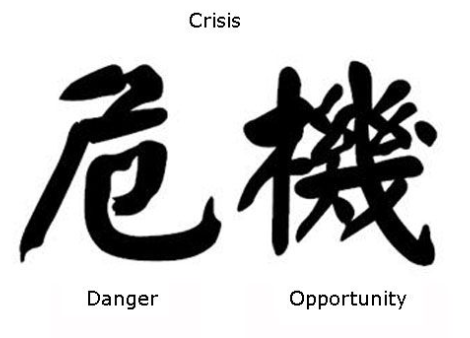Well, we’re not long into this COVID crisis, but every day we are all having to think differently about what it means for each and every one of us.
 So we thought we’d take stock of where we’ve got to – and what we – in our very small organisation – are learning so far from people with dementia. We want to work with them to counter fear and uncertainty with hope, pragmatism, humour and courage. And we want to recognise that every crisis brings not only danger but opportunity – as the Chinese character for Crisis testifies.
So we thought we’d take stock of where we’ve got to – and what we – in our very small organisation – are learning so far from people with dementia. We want to work with them to counter fear and uncertainty with hope, pragmatism, humour and courage. And we want to recognise that every crisis brings not only danger but opportunity – as the Chinese character for Crisis testifies.
Not surprisingly, people with dementia are telling us that they are finding all this very discombobulating and confusing. Wendy Mitchell has written a poignant poem about her feelings now that she is self-isolating in this ‘different world’. And in her blog, Wendy says: “Me and a few of my playmates have all said how our speech is more of a challenge now, word finding slower, more gaps in our sentences. So it is still a possibility that this challenge will continue. But we’re all trying to fight it through Zoom calls and through recording Dementia Diaries – at least we have those options.”
Many people are finding their emotions are more volatile. Jacqui, for example, has been very upset that her PA has had to suspend her services – but is asking for a retainer fee: “I was really, really shocked… I had a terrible night’s sleep – I don’t think I did sleep – I woke myself up shouting… I really didn’t expect it to affect me that much.”
At the same time, the resilience and imagination of people with dementia is endlessly impressive and (yes, a cliché) inspiring. They have been dealing with uncertainty and confusion for many years, and have so much to teach us. Agnes has recorded a Diary to explain the ‘silver lining’ of the crisis: “It’s going to be very, very interesting and I’m looking forward to it. And, to those who are listening, maybe you can’t pop in and see people living with dementia, but try and think outside the box. How can you connect with them? How can you relieve their anxiety, their isolation? And I’m just thinking I’m creating a new pathway. Wow I think it’s wonderful.”
George Rook is another person with dementia who is using his blog to help come to terms with the crisis: “We may not have the care and support some of us need. We definitely won’t have the face to face company and touch that we all very much value. The travel that provides variety, challenge and confidence. But it does me no good to think about how things ought to be. How things might be in a perfect or even imperfect world. And it does me no good to dwell on this shitty disease, the nightly ‘mareish dreams, and the things I find difficult… No, I am feeling much more relaxed than for years. Hugely relaxed. Can’t believe it. I’m not angry and frustrated about my CCG. I’m not worrying about an agenda for an upcoming meeting. Or whatever I committed to doing at the last one. The evenings are getting lighter and, sometimes, warmer. My seeds are growing… So my message is… Don’t dwell on difficulties. Find something new to do.”
Our Dementia Diaries project is already based on remote communication – but we are now upping our efforts to attract more would-be Diarists. This is because we know how much it helps people to be able to offload their thoughts and feelings into an audio diary. For those who wish, Steve is facilitating a ZOOM meeting for Dementia Diarists every Wednesday morning (contact steve@myid.org.uk).
We have also got a dedicated page for Coronavirus Diaries which is building every day, and which is a fantastic resource for families, researchers, policy-makers and practitioners – as well as for people with dementia themselves. Keith Oliver for example has written a letter to his old adversary ‘Dear Alzheimer’s’. Glenda tells us how she is keeping busy and positive, and Julie points out that people with dementia can show the rest of the world how to cope, and urges us to stay positive. Meanwhile, Dreane decides that a naughty poem about knickers will cheer people up!
Like everyone else, we have sadly had to postpone all our planned gatherings and physical meetings – and to find new ways to keep people busy and engaged. Some projects lend themselves readily to virtual collaborations – for example our Dementia Enquirers Pioneers will be working with a high profile researcher over the summer to co-produce a journal article for ‘Disability and Society’. All the work can and will be done by ZOOM and email.
More generally, we have been trying to oil the wheels of communication so that people can stay in touch with each other. We want to reinstate the joy of communication through letter writing and phone calls. We’ve already sent out dozens of handwritten picture postcards – and will be sending many more. Some recipients have replied with a letter, a postcard or a phone call – and it’s clear that this simple contact means a lot to them (especially to those who are not online).
We are luckier than many others because we’ve been using ZOOM for a long time now, so many of the people with dementia we work with are very comfortable with using it (in fact, they actually taught us!). Frances Isaacs and the ZOOMettes have already made a film about how to use ZOOM on a laptop or desktop PC (you can view this below). As well as a guide to setting up a virtual peer support meeting using Zoom.
How to use ZOOM – click the video below to watch
Our colleague Steve has been quick to produce several short videos, focusing on helping those who are less familiar to install ZOOM onto their phone (not needed for laptop or desktop computer – see video below) and on how to respond to an invitation and take part in a ZOOM meeting (see second video below). We’ve also adopted a format for ZOOM invitations and reminders (shared on Twitter) to help people be clear about which Zoom meeting is which.
Getting ZOOM on your iPhone – click the video below to watch
Joining a Zoom meeting on the iPhone – click the video below to watch
We are too small to stay in contact with everyone and we are not resourced to provide a helpline, or local support or advice. So, with the DEEP network, we are focusing on supporting local group facilitators, with regular weekly ZOOM meetings (contact Anna Anna@myid.org.uk for details). Supported by DEEP, Wendy Mitchell is also hosting a twice-weekly ‘ZOOM ‘cuppa’, which anyone is free to join up to.
We are also publicising on the Innovations in Dementia website a small number of resources that we think are especially helpful to people with dementia and those who are supporting them. And we are distributing more hard copies of DEEP News so that the group facilitators can send them on to anyone who wants one (in addition to the online and audio versions). Rachel our DEEP coordinator, has set up a sunflower growing competition and a collaborative blanket making activity.
Of course the individual DEEP groups are working very hard to keep in touch with everyone. For example ‘Me, Myself & I’ in Briton Ferry, Wales are offering up to three phone or video calls a week, and a monthly ‘letterbox chat’ by the gate or on the doorstep. And York Minds and Voices are meeting weekly by ZOOM (some members have never even used a tablet before, but all are being supported to do so). ‘Still Me RCT’ are carrying on their creative activities by posting equipment and putting instructional videos online. They are also thinking of creative ways to use their recycling – such as growing seeds in juice containers.
We are also using this period to strengthen relationships with other dementia organisations and to redouble our efforts to work collaboratively for the good of all. More on this soon…
Finally, we’ve put together a video message (see video below) summarising this approach and explaining how we are helping people to stay engaged and connected. We particularly want to stress that everything we are doing or planning is based on the expressed need and experiences of people with dementia – and almost always based on their ideas and solutions. This unprecedented crisis offers all of us a new opportunity to do that.
A message to people with dementia from Innovations in Dementia – click the video below to watch
Philly Hare
Co-Director, Innovations in Dementia

